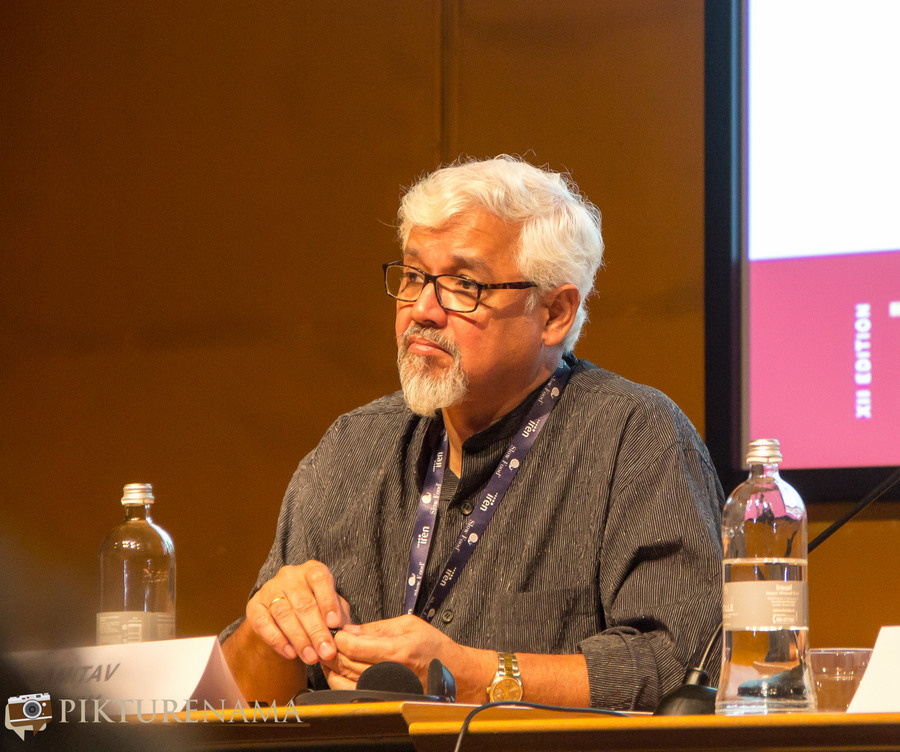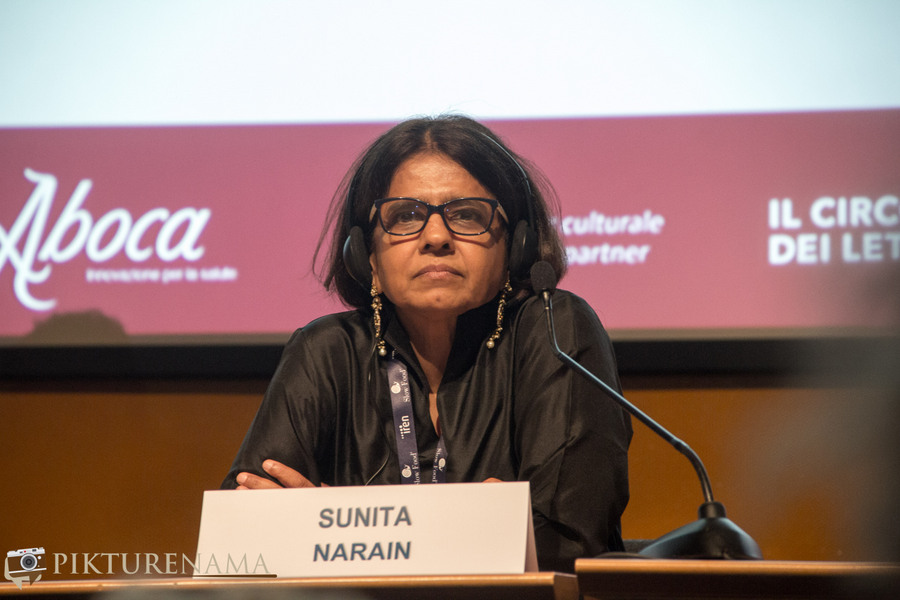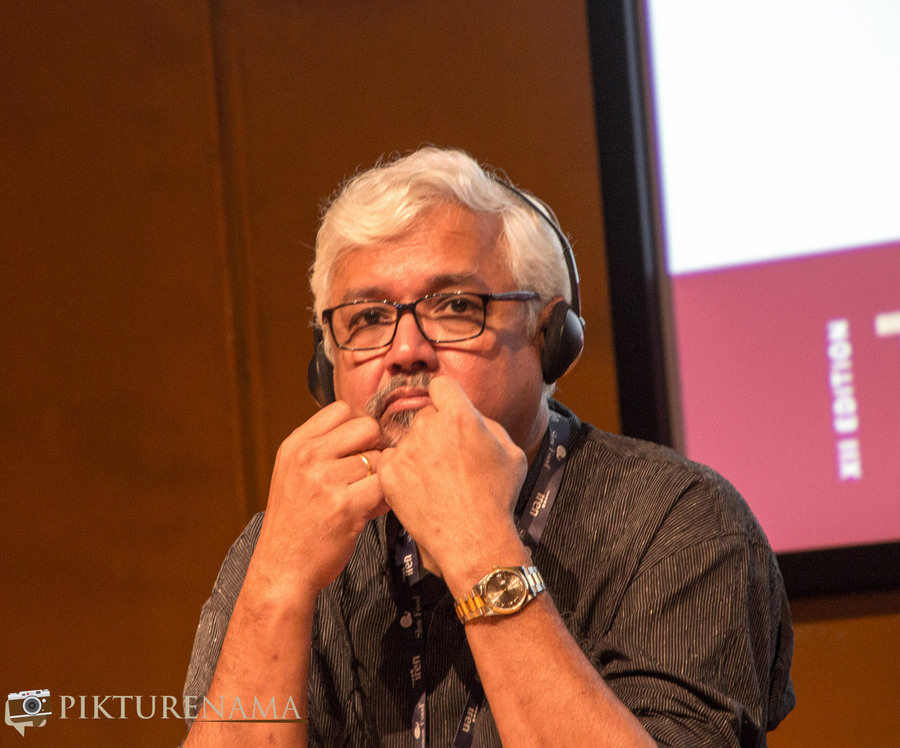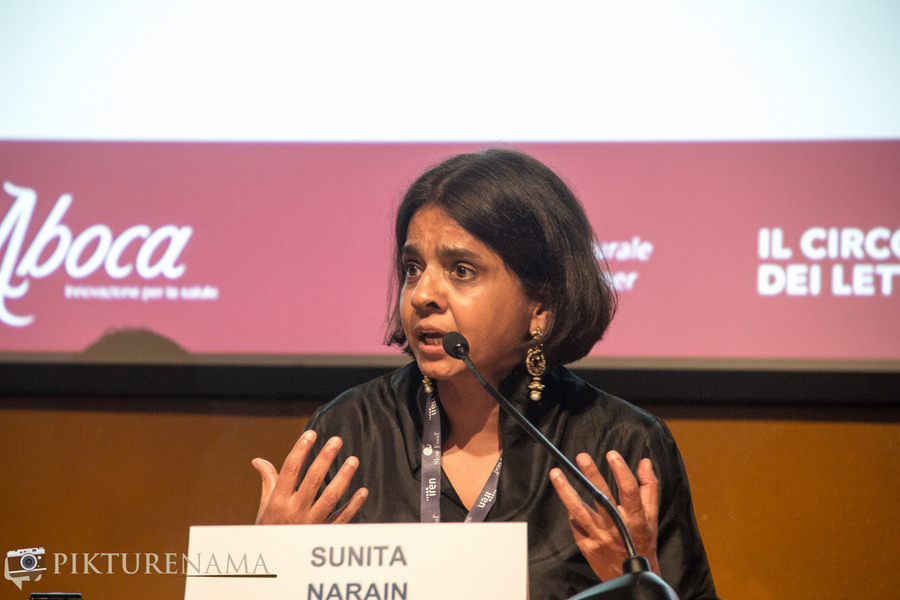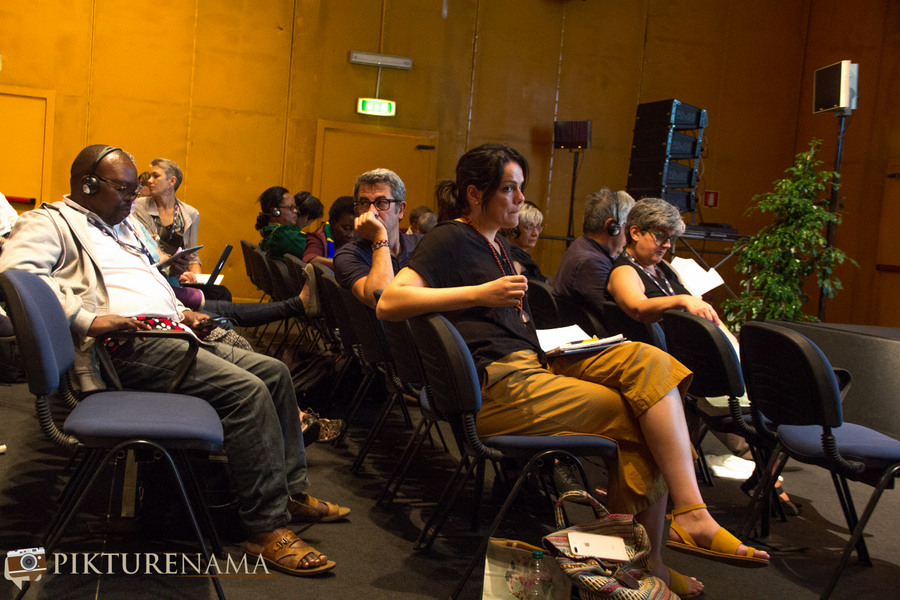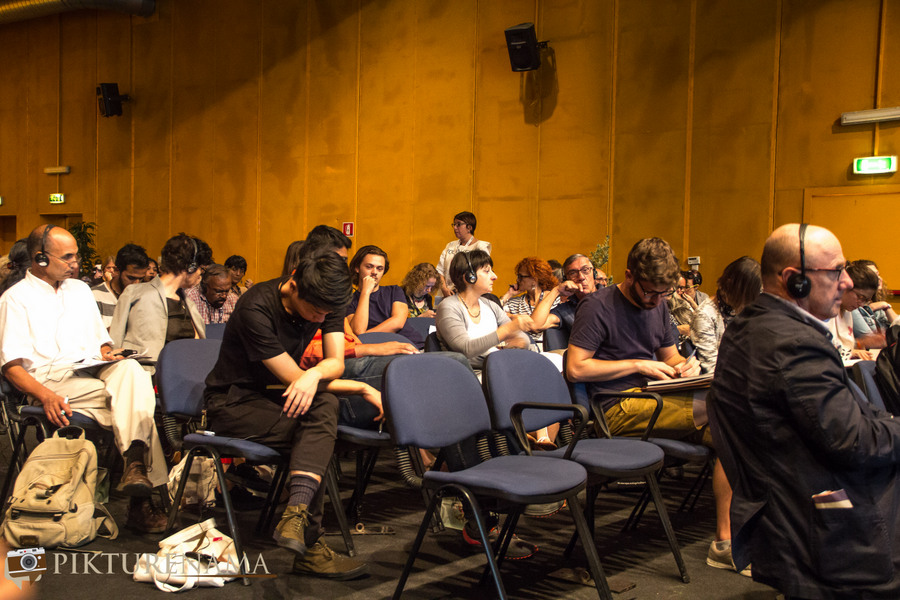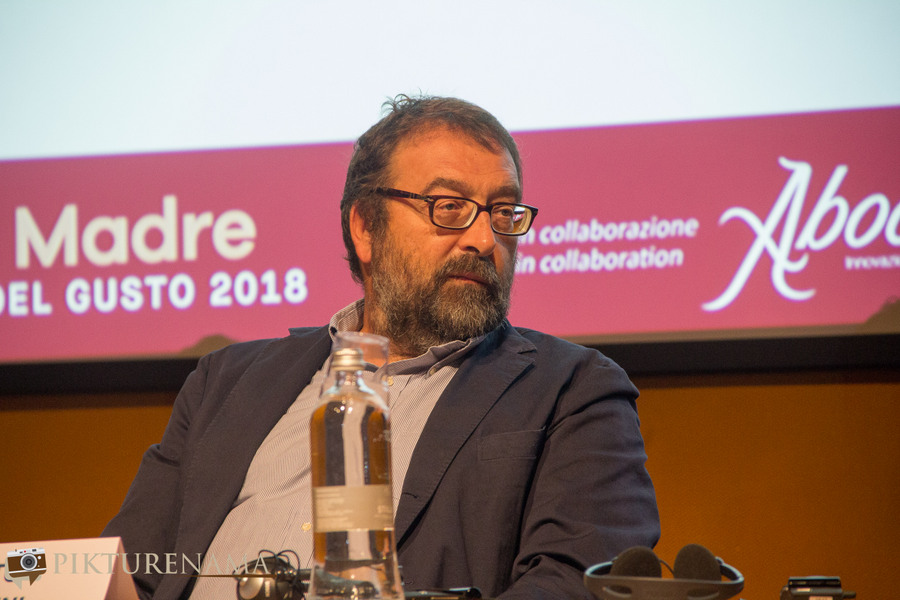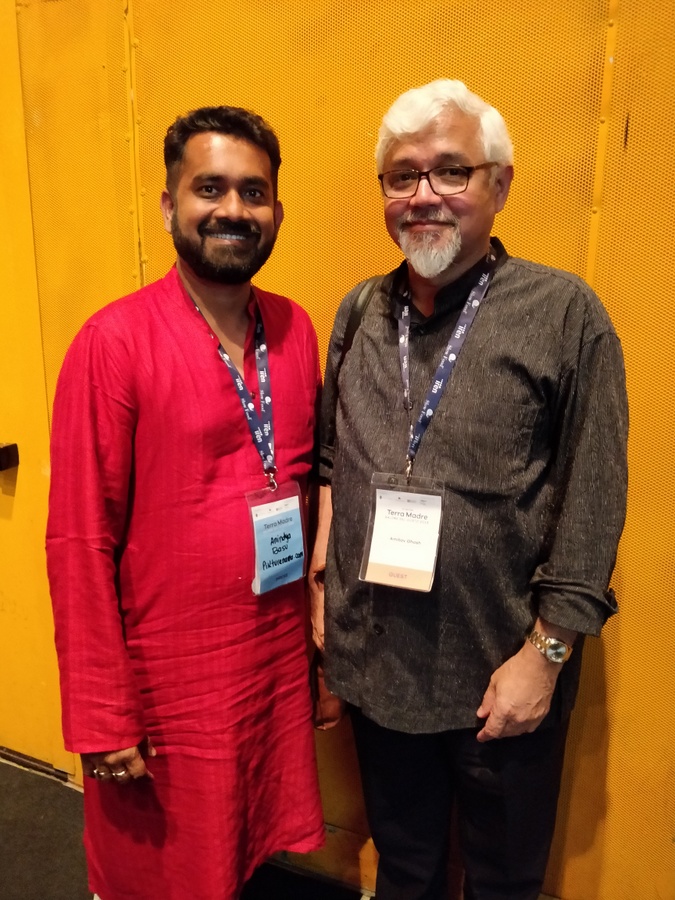This is as recent as this year Kali Pujo. If you are from Kolkata, then you would remember how we woke up to a smoggy suffocating Kolkata the next morning and within no time, there was a spell of shower, which is uncharacteristic for this time of the year.
As Sunita Narain had said – It’s not a simple phenomenon – the new normal today is a very different normal – The thoughts echoed in my mind when I sat down to write this.
I attended Terra Madre Salone Del Gusto 2018 as a delegate. As I received the schedule, I was keen to attend this one discussion where Amitav Ghosh and Sunita Narain would speak on climate change. Exploration of new areas of interests and that too, which affects the eco system and the food for all of us, drew my attention. Little did I realise that this is the biggest effect that mankind has ever faced.
How do we proceed as a society in Climate change? What can we do? We started with this at Terra Madre Salone Del Gusto
Amitav Ghosh started the session with a hard hitting fact that one of the biggest problem of the issue of Climate change is that we don’t speak about it. There was Hurricane Florence in North Carolina, the deluge in Mumbai and Chennai and the other rain bomb events across the world, which the media covers. What the media fails to talk about during such events is about climate change. As it later came out during the conversation that somehow, the issue of climate change has been stereotyped to scientists and environmentalists and although the general population gets equally affected, they are not supposed to discuss about it. What can be a better example of an elephant in the room?
We had the other panelist as Sunita Narain, Director General of Centre for Science and Environment and perhaps, one the of the most prominent faces of championing the Climate change cause in India. She started with the Kerala floods where it was a deluge rather than flood. My attention was piqued when she said that under the current circumstances, development cost of Kerala is almost the same as rebuilding a new state. Double whammy is when Kerala loses out on development dividend in the process. It is the sheer mismanagement of the local environment that destroyed the drainage system of Kerala. It’s true that we don’t discuss these things enough in public and as Sunita suggested, we can’t get scared and then start feeling helpless because if we feel helpless, then we won’t be able to handle this.
It rained 700mm in Kerala in a week and entire Italy has that amount of rainfall in a year
How do we tell the Climate change story? Do we need a guideline to discuss Climate change and spread awareness?
Scientists are guided/ have directives about how to deal with Climate change. What about the common man? Amitav Ghosh highlighted that most of the time, it is the median impact which is predicted but the in reality, the effect of climate change is way more. Let’s not forget that Climate change is the biggest change that has happened in Human History and as species, we have never faced anything like this. The worst case scenarios are terrifying. Can there be a guideline on how we speak about it? No, there isn’t any and rather shouldn’t be, as then it will restrict the conversations.Time has gone beyond laying a guideline of how to speak about Climate Change, rather let’s have a free speech. It should be a field of freedom. So how to tell the Climate Change story? Factually, straight forward and each one has got personal stories to tell and let’s voice all of them. Individual stories substantiated by facts would bring in more interest. It’s science and scientists who have alienated the main effect and we all know that it’s weird weather which is getting weirder but then why?
Climate change and migration? How many migration stories we know?
Climate change and migration – Amitav Ghosh once said that one of the worst effects of CC is migration. In Italy itself, it’s not only Bengalis (who are migrants from Bangladesh) but there are migrants from Pakistan also. The disappearance of lands, the flooding of Jhelum; not a single of them describes them as climate migrant. The funny part is that this cannot be handled by growth at home. Bangladesh as a country, has growth which is more than India and is an Asian miracle story. Yet, the outflow of migrants in Bangladesh is increasing. Climate change and migration are the results of global heating.
Case study of Bundelkhand – We all know about the long time drought which affects the central part of India. A place which once used to receive 800 to 900 mm of rain, in the last 7 years has got the monsoon rain falling days reduced by half. As per this report , almost half of four million farmers living in this region have migrated temporarily or permanently, leaving the village going to cities to earn their livelihood. These are young people, who otherwise would have been farmers. However, the bigger problem than the loss of manpower is the loss of knowledge. These competent farmers, who have the expertise of farming in water stressed areas like Bundelkhand are lost due to climate change. The ultimate outcome will be decrease in food production. It’s a domino effect. Now interestingly, there was a dedicated day/session at parliament on this and sadly, only one tenth of the members showed up. Ghosh was vocal in highlighting the fact that the journalists from mainstream media, who were covering the drought, rarely mentioned about Climate change.
How do we take action and how can we use the power?
China had been able to close 50 coal based power plants where as, we have been able to close 1 in Delhi. In a very erudite manner, Sunita Narain said that there is a difference between the environmentalism of rich and the middle class and the environmentalism of the poor – The environmentalism of middle class started with industrialization of West and as we grew richer, the downside was with industries and their toxic wastes. The rivers were contaminated and the price for growth was this. The problem with this environmentalism is that you stay behind the curve and as she points out, it’s like a garbage managers environmentalism. When the poor gets a voice for environmentalism, that’s democracy. An example of this is till date, the middle class and the rich have been looking for a dumping ground in the city for all the wastes. Now even the poor says that ‘not in my backyard’, which till date used to be said only by the rich.
We all want to live like Americans and we also know that the lifestyle of the Americans can’t be handled by our planet.
Do we realize that it’s one planet and Climate change is a great equalizer?
The scale, the pace, the sheer enormity with which climate change is happening is mind boggling. Sunita points out that the United Nations Earth Summit which was held in 1992 in Rio, had an agreement signed which said that there is a right to development for all as is the right to common atmosphere which belongs to everyone. It was built on a notion that growth needs to be built on an equitable climate agreement. The rich will reduce the growth, the poor will have a right to development and all of us will have to do things differently. Alas, we didn’t do anything about it. Worse, we forgot that we are interdependent as a race. The west has not reduced the emissions and to an extent, the greenest countries of the world have not done anything to reduce the emissions. The productions have got outsourced. The rich and the poor equally gets affected. It’s like when you are in Delhi, irresepective of being rich or poor, one has to breathe the same air.
Amitav points out that the only index which has been rising in competition with the greenhouse gas emissions is the defence spending. Almost all countries have increased the defence spending. By spending on defence, we are inventing new tools and gadgets and fighter planes e.g. fighter jets like F 16 in 1 hour consumes gas which is equivalent to 4000 American households consumption of gas!!
The climate change is an expression of our evil nature which we are inflicting on each other and on the planet.
Living in denial – the book that no one should miss
In between the discussion, Amitav brought in the reference of one of the best books he has ever read on climate change – Living in denial by sociologist Kary Norgaard, which speaks about an actual rural community in western Norway. The residents are educated, very rich, leftists and have been hit very badly by climate change as the town depends on snow. However, the snow is gone. In 2000 – 2001, the snowfall was delayed by two months. Ice fishing was impossible and skiing, which is a main tourist attraction was affected badly. They educated the community, who otherwise raises a protest about racism, support to migrants attributed this to global warming, could not/ did connect the dots to climate change. Aren’t we all living in this so called socially organized denial, where we know the facts about climate science in abstract but we can never relate it to political, social or private life?
We all know what deforestation means to us but have we ever thought about it? As Amitav points out, what does development and growth mean to us? One of the main areas is production of cement which is not only energy intensive but in the process, releases huge amount of carbon.
It’s rare that there will be couple of Indians on stage, few Indians in audience in this session at Terra Madre Salone Del Gusto and it’s a meeting of World Slow food Organization and we won’t speak about food habits.Must mention here the entire session was brilliantly moderated by Italian journalist Roberto Giovani.
Why as an environmentalist, Sunita would not support vegetarianism ?
Sunita referred to a piece which she wrote on why as an Indian environmentalist, she would not support vegetarianism – the reasons are simple as one, she is secular and she respects the culture which eats the meat, two – about the fact that meat is an integral part of farmers’ income and keeping the livestock is also mitigating the risk mgmt strategy. The farmers here follow AgroSilvoPastoralSystem which improves the fertility of the land. When the farmer keeps a cattle, it needs to keep it for milk and meat value. When you take away the meat, you are demonetising him. It’s not the question of meat but how you grow the meat and how much meat you consume is the concern.
P.S. – As I was writing this, listening to the audio recording , Tugga asked me what is climate change? He just proved once again what innocence can do as he asked about the elephant in the room. We all tend to avoid it. I dabbled at saying that when I was of his age, in mid November, I always needed winter clothes and now we are switching on the fan as well as AC in night. Did I once again miss out on catching the issue by its collar?


